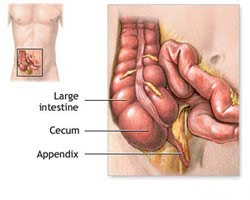OK there was an article posted on Yahoo home page early this morning stating that appendix and actually useful - not
'a worthless evolutionary artifact, good for nothing save a potentially lethal case of inflammation. '
'Now researchers suggest the appendix is a lot more than a useless remnant. Not only was it recently proposed to actually possess a critical function, but scientists now find it appears in nature a lot more often than before thought. And it's possible some of this organ's ancient uses could be recruited by physicians to help the human body fight disease more effectively. ' So there, Ha... I always thought the medical theory that all people should have their appendix removed whenever there was sugery in that general area of the body because it was good for
nothing but potential problems later.....
Here is a link to the article:
http://news.yahoo.com/s/livescience/20090824/sc_livescience/theappendixusefulandinfactpromising
And also there is a link in this article that goes to another article about about our immune systems and
another theory about humans being 'too clean.'
The link is: http://www.livescience.com/health/090504-humans-sick.html
'Among the possible causes for our modern ills: super-hygiene, sedentary lifestyles, and a lack of worms in our stomachs.' ... a quote from the article.
'Unusually, the number of ailments involving malfunctions of the immune system has gone up as well.
Multiple sclerosis, a disease where the fatty insulation around the nervous system comes under attack, appears to be on the rise, and type I diabetes, "a childhood form of diabetes almost unheard of at the turn of the 20th century, is up from one in 5,000 or 10,000 to one in 250 in some regions," said Joel Weinstock, chief of gastroenterology at Tufts University Medical Center in Massachusetts.
Even hay fever, which plagues roughly 1 out of 4 people in the United States, is something that may have largely emerged only in the 20th century, Weinstock said "What if I told you that there are some countries that don't even know what hay fever is?" he asked.
The rise of these disorders might be due to the very improvements in hygiene that have helped reduce infections in much of the world. The body's immune system is regularly exposed to antigens, molecules that it recognizes and reacts to, such as compounds from viruses or bacteria.
"But the immune system needs to be controlled, needs to not act up when exposed to things that aren't truly injuring you," Weinstock explained. "What we think is happening is the regulation mechanisms are becoming less effective. As to why that is, is it possible that it's due to lack of exposure to antigens? Do you need to be exposed regularly to antigens for it to work properly?"
You need worms
For instance, many fewer people are infected with worms than before.
"If you look back at the human race in the 20th century, every child and adult had worms in their gastrointestinal tracts," Weinstock said. "They were part of the ecosystem of the gut. As it turns out, worms are very potent at controlling immune reactions, in order to live happily ever after in the gut. Our theory is that when we started deworming the population, that is one factor that led to the rise in immunological diseases."
As part of this "hygiene hypothesis," Weinstock also notes that dirt roads, horses and cattle used to be far more prevalent in life than they are now.
"Our theory is that when we moved to this super-hygiene environment, which only occurred in the last 50 to 100 years, this led to immune disregulation," he said. "We're not saying that sanitation is not a good thing — we don't want people to jog up to river banks and get indiscriminately contaminated. But we might want to better understand what factors in hygiene are healthy and what are probably detrimental, to establish a new balance and hopefully have the best of both worlds."
There is more in the immune article that you might want to check out but these particulars I quoted from it here are what I have said for a long time. If you don't exercise that immune on a rather regular
basis with what is in your environment, then you might be upsetting the balance of its' abilities.
And also check out the article about the 'average' life spans. There is a viewpoint there that I had not
considered before.
The Truth on Longer Life Spans - http://www.livescience.com/health/060523_infant_mortality.html
"Reduced infant mortality, more than any single contributing factor, has been responsible for the spectacular rise in American life expectancy. The reason is simple: for all of the other factors on the CDC’s list to have any effect, a baby must survive to childhood."
So there I have learned something - and something we must remember that the 'averages' lists don't always give a true picture.










